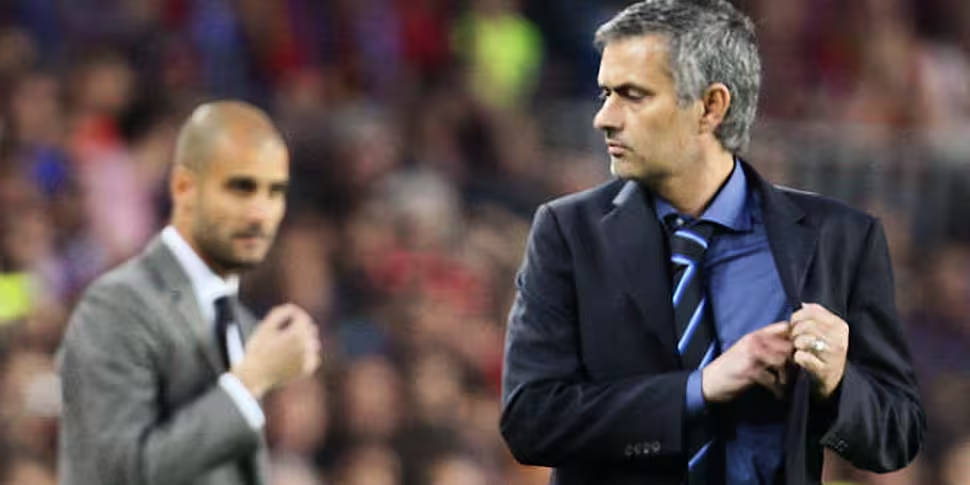They say opposites attract, and fate has seemingly conspired to bring Pep Guardiola and Jose Mourinho together once again in Manchester.
Both have two Champions League titles to their names as managers, both spent time in Italy - Pep as a player - and both have managed Spain's biggest clubs, on opposite side of the 'Clásico' divide.
Pep and Jose have shown that they are ruthless when dealing with players, whether it's Guardiola's treatment of Joe Hart, Yaya Toure and Zlatan Ibrahimovic; or the taste of Mourinho's single-mindedness that Bastian Schweinsteiger got at the start of this season.
Another shared element ahead of the Manchester derby is that both men wanted to learn from others on the way to the top of the managerial game - and it meant they crossed paths at Barcelona when Guardiola was a player and Mourinho was a assistant to Bobby Robson, and later, Louis van Gaal.
Unlike Guardiola, Mourinho did not have a playing career of note to help him. His ascension into coaching began as an interpreter when Robson took his managerial career to Portugal in the early 1990s.
However, the future-Manchester United manager saw his role as bigger than interpreting what Robson was saying before passing on the instructions to the players.
It's a period detailed in Mourinho: Anatomy of a Winner by veteran English football writer Patrick Barclay, who spoke to Newstalk about his early beginnings.

Milan's coach Jose Mourinho, left, touches the back of Barcelona's coach Pep Guardiola, cente, during the Champions League semifinal second leg soccer match between FC Barcelona and Inter Milan at the Camp Nou stadium in Barcelona, Spain, Wednesday, April 28, 2010. (AP Photo/Manu Fernandez)
Even as an apprentice, he was always clear about his own ideas, something which impressed Louis van Gaal - a coach with a different philosophy but happy to give Mourinho the opportunity to grow and apply some of his own tactics.
Indeed, he even gave Mourinho the chance to take charge of the Barcelona team in the Copa Catalunya in 2000.
"He probably got a better education from Louis van Gaal than from Bobby, because Van Gaal entrusted him with first-team players, including the great Pep Guardiola," Barclay explained.
"He had the perfect grounding in that sense. But working on a daily basis with supposedly difficult characters -although, I must say Bobby Robson was very complimentary about the likes of Hristo Stoichkov - but to work every day with people like that... You can imagine opinionated people like Guardiola, who, as a player, spoke his mind, it was in this sort of crucible of people that Mourinho developed his craft.
"So he was very, very lucky there and very different in terms of the way he approached things. As soon as he went into management, it all became different; he became more spiky and defensive and aggressive at the same time."
Meanwhile, Guardiola set out to expand his knowledge even as a player by departing Barcelona, where he had been trained in the principles at La Masia before taking that further under manager and mentor Johan Cruyff. Those principles under-pinned his basic tiki-taka philosophy when he took over as Barcelona manager in 2008, after being promoted from the B-team.

Former Barcelona soccer coach Pep Guardiola speaks at Mexico Siglo XXI, an event organized by the Telmex Foundation in Mexico City, Friday, Sept. 21, 2012. (AP Photo/Alexandre Meneghini)
Prior to that, he had gone to Mexico to play for Dorados, who were coached by a manager he admired: Juan Manuel Lillo, the current Sevilla assistant boss.
That brief adventure between 2006-07 was eloquently portrayed in The Guardian by Duncan Tucker, detailing the final season of his playing career which saw Guardiola building towards his coaching ambitions.
Speaking to Tucker, Lillo explains that the Catalan already had a "coach's mentality" and it comes as no surprise that he engaged his manager in talk of possession football and tactical concepts for hours on end.
The assistant manager, Raul Caneda, said that the the idea of defending from the front at Dorados influenced Guardiola strongly. Indeed, if you remember his Barca team and their intense pressing, they applied a six-second rule, which meant players harried the opposition for short bursts before dropping back if they were unable to win possession back immediately.
Shortly after that he was off to Barcelona where he began to apply his ideas on and off the pitch in the B-team environment.
An example is the use of motivational videos as revealed in Graham Hunter's Barca: The Making of the Greatest Team In the World which first saw light in the B-team before he used them in the senior setup.
Whether he chooses to use motivational videos ahead of the Manchester derby is unclear, but he and Mourinho will still be applying the lessons taken from their days as apprentices when they meet in Manchester.
Download the brand new OffTheBall App in the Play Store & App Store right now! We've got you covered!
Subscribe to OffTheBall's YouTube channel for more videos, like us on Facebook or follow us on Twitter for the latest sporting news and content.








